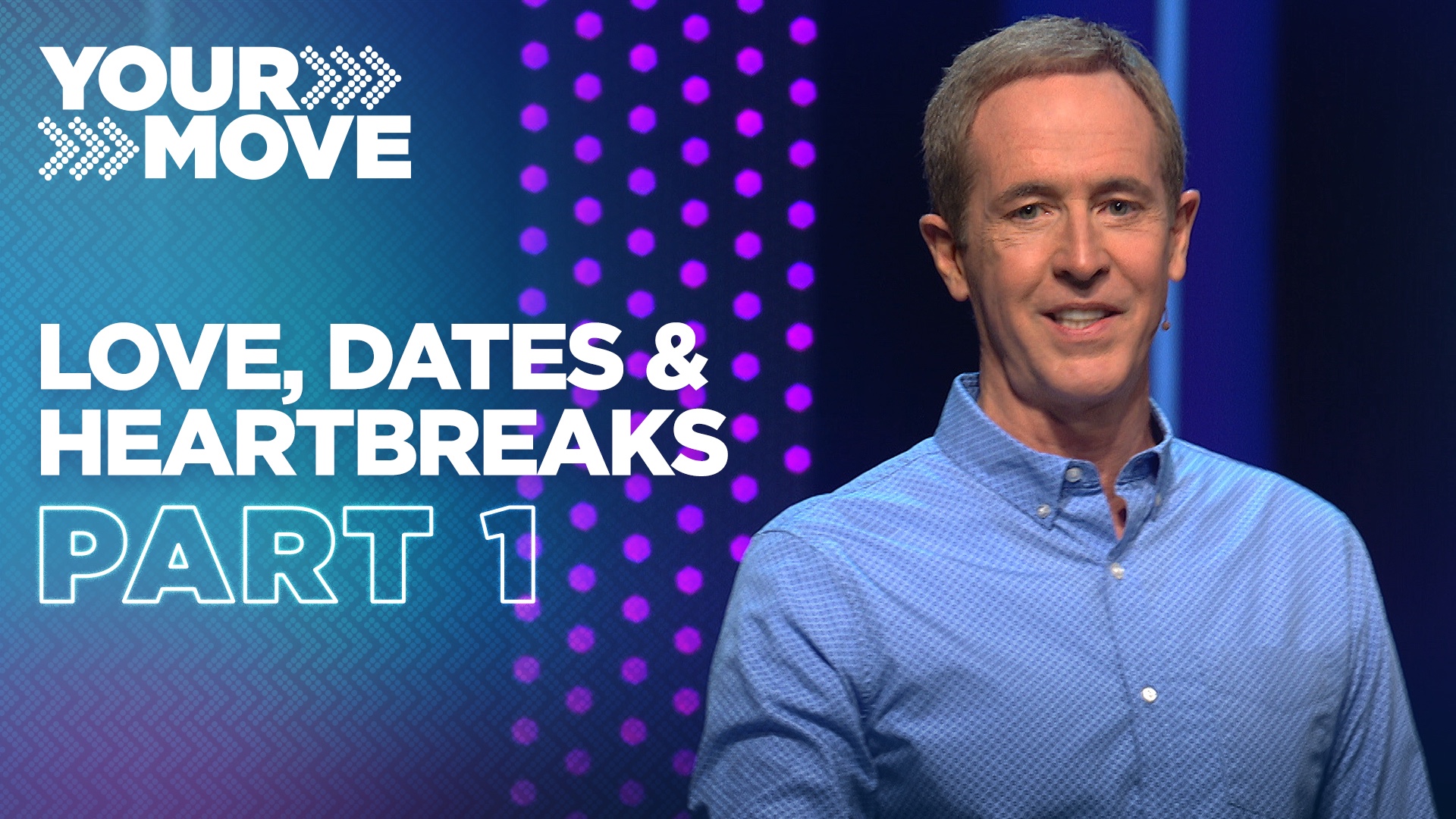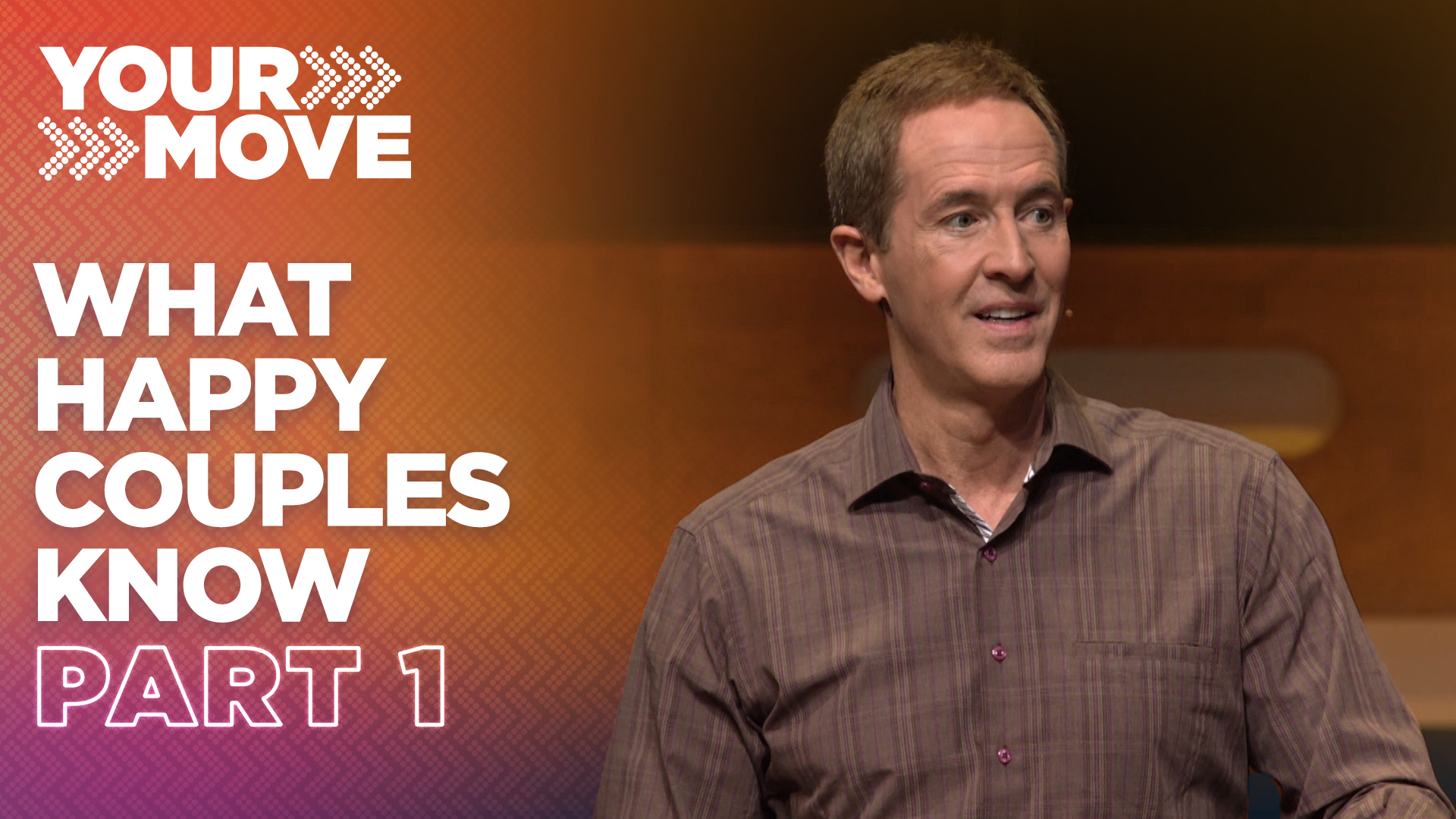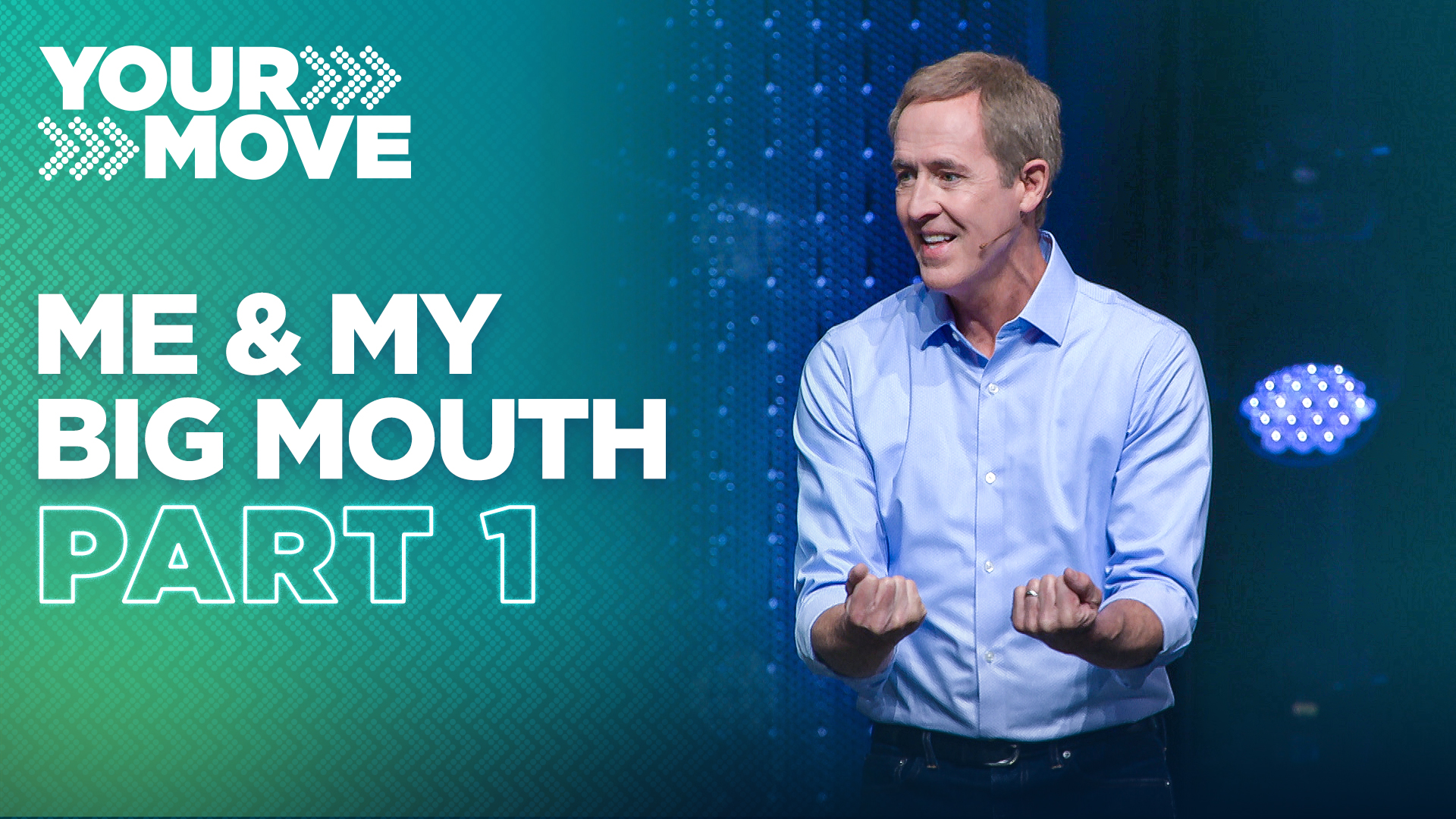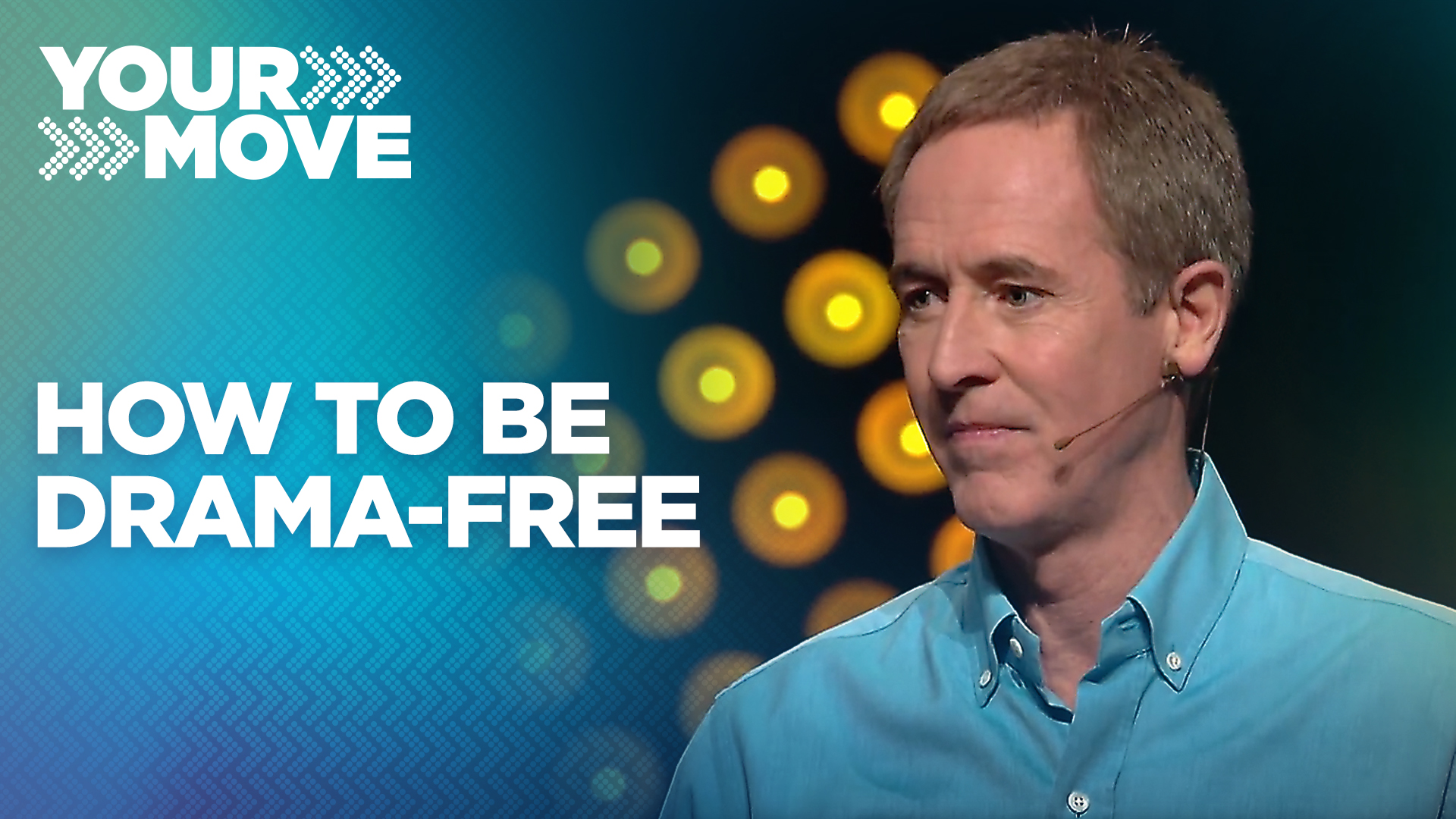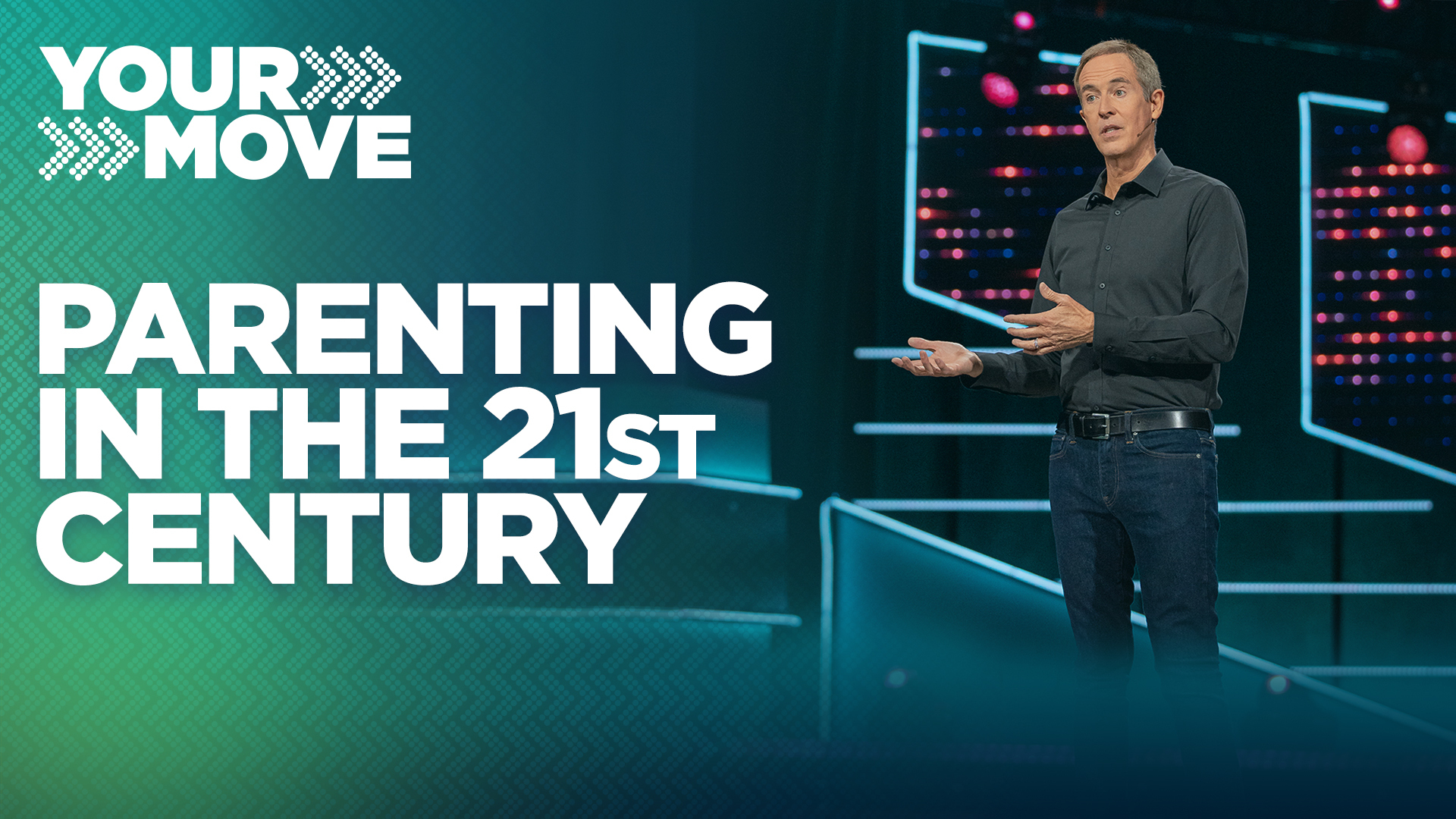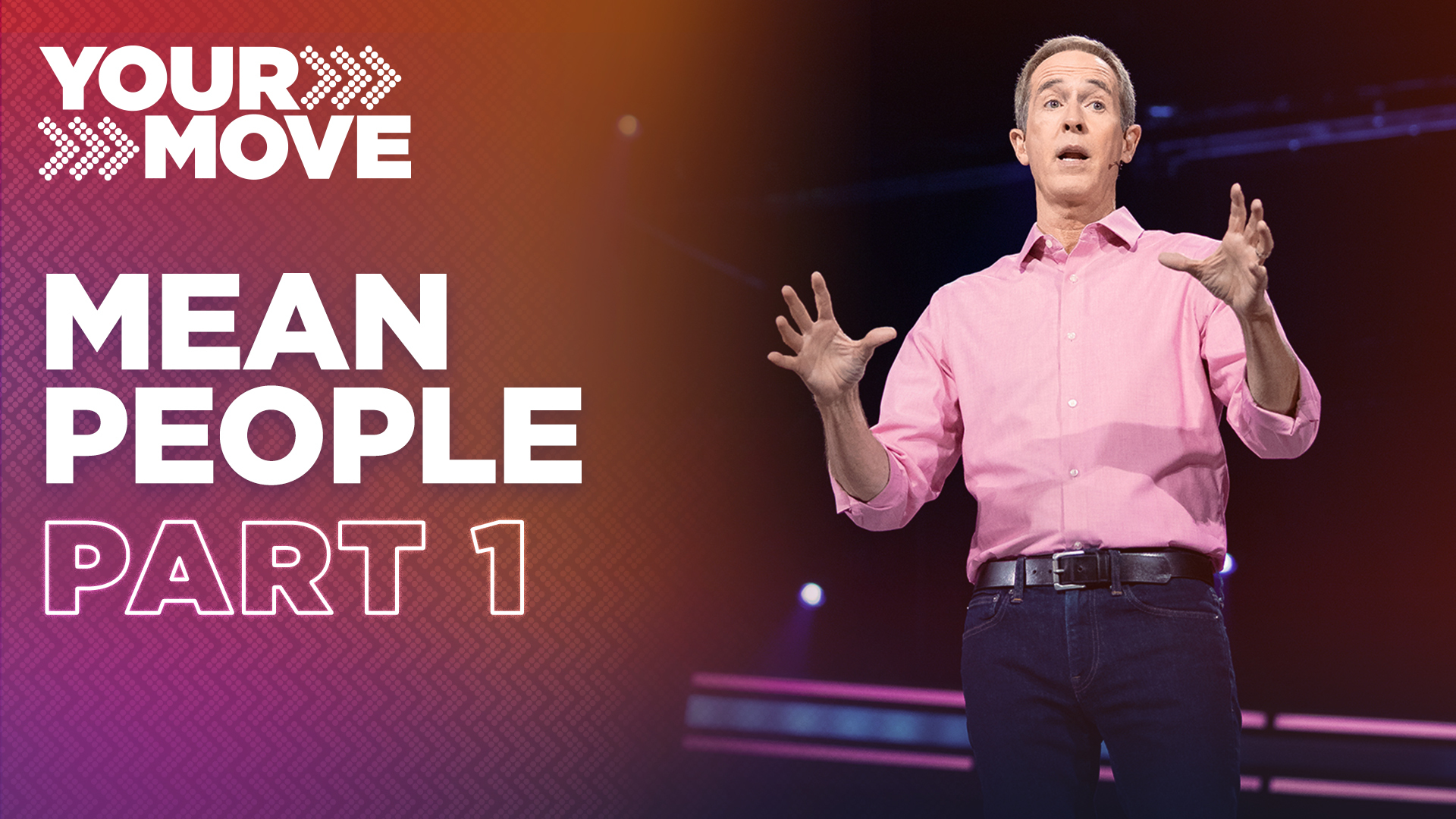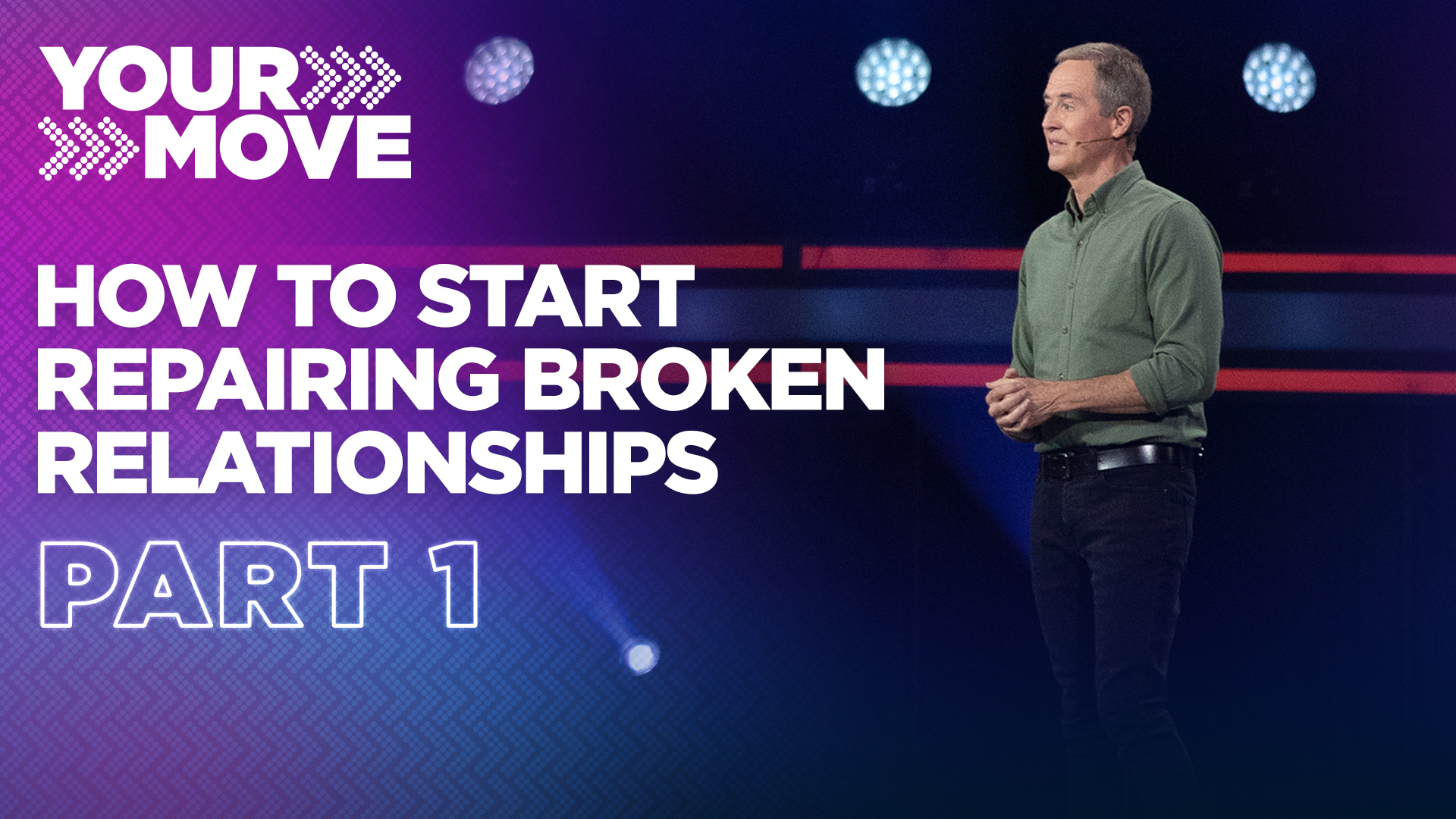We all have drama in our lives. Most of us want less of it. So where do we start?
- How does drama (regrets, bad habits, etc.) tend to show up in your life?
- Andy mentioned that people who live relatively drama-free lives spend time on things that are not about themselves. Have you found this to be true?
- Do you agree that drama always begins with an unwise decision? Why or why not?
- Andy mentioned that the clearer you are about your future, the greater motivation you’ll have to make wise decisions. How much clarity do you have about your future?
- Consider where you want to be in the future (relationally, financially, spiritually, or otherwise). What is a wise decision you can make to get there?
NOTE: The following content is a raw transcript and has not been edited for grammar, punctuation, or word usage.
So, let’s talk about how to be drama-free. So, how do you be drama-free?
First of all, we need to define the term, and then we need to look at a distinction. The first term we need to define when it comes to living a drama free-life is the word… Guess what? What’s the word?
Drama.
Drama, thank you. So, here’s the definition of drama, in case you didn’t know: An exciting, emotional or unexpected series of events or set of circumstances. That’s the worst definition. This is the dictionary definition of drama and when we think drama, when you think you’re drama, when you think middle school drama, high school drama, college drama, single drama, first marriage drama, second marriage drama, in between marriage… This isn’t what you think. So, I went to the fountain of all truth, Urban Dictionary, and looked up…
[laughter]
The definition of drama. But before I show it to you… Ladies? Okay, here we go, here’s the… I didn’t make this up, okay? I’m not necessarily agreeing or disagreeing, I’m just gonna show you a better definition of drama, and if nothing else, you are paying attention so we’ve already accomplished something great.
So, here is the Urban Dictionary definition of drama. It’s kinda long, here we go. Something women and especially teenage girls thrive on.
[laughter]
I heard a guy say, “Amen”, “Amen, I like that, that’s something I agree with.” That’s just the beginning, ladies, it gets worse, but let’s be honest… Us guys, we’re not drama free, we just express it in different ways. We have our own drama, right, ladies?
Yes.
Come on ladies, don’t we have our own drama? That’s right, Amen. Okay, so here we go. It’s something women and especially teenage girls thrive on, consisting of any number of situations that have an easy solution which would bring a fairly good outcome, but these girls choose another bad way to deal with it. Again, consisting of backstabbing, blackmailing, gossiping, and betraying their friends.
[applause]
But we’re not done, because now whichever one of you created this definition, that’s what so great about Urban Dictionary, everybody can play, okay?
[laughter]
Somebody came along and gave and example. For example, [laughter] “I wanna break up with him, but still love him.” It drives men and “normal” girls nuts.
[laughter]
How many normal girls do we have in the room tonight? Yeah, the normal girls. Yeah, okay. So that’s a way better definition of drama. So we all got a picture of… When we’re talking about drama, that’s what we’re talking about, okay? It’s just that crazy, crazy, crazy thing that we get sucked into, we get dragged into, we find ourselves saying, “How in the world did I get in the middle of this? Why in the world did I say that? Why did I bring that up? Why did I invite her? Why did I go home for Christmas? I should have spent Christmas alone, right?”
[laughter]
And that brings us to a very important distinction, there’s two kinds of drama. There’s unavoidable drama and there’s avoidable drama. Now, unavoidable drama is all, and we know this, unavoidable drama is all things family, right? [laughter] It’s unavoidable because they’re your family. Now, when I was preparing to talk to you all about this I thought, “This is a good time in the talk to tell a story about unavoidable drama in my personal life.” But I can’t, because all these people are still living, right?
[laughter]
And they’re recording this, but I’m telling you, if you think you got drama, yes you do, I got drama… How about you? … Everybody has family drama, whether it’s navigating Christmas, navigating Thanksgiving, navigating dinner, navigating who’s coming or who’s leaving, and make sure they’re gone. Everybody, when it comes to family, this is unavoidable. So, for the rest of our time together we’re not gonna talk about the unavoidable drama, it’s unavoidable. But here’s the thing, because there is a drama you can’t avoid, we need to do everything we can to avoid the avoidable drama. So the avoidable drama is like boyfriend drama, and girlfriend drama, and in some cases, money drama, and job drama and friends drama and schedule drama.
And the interesting thing, and where we’re gonna drill down in our time together, this is gonna be fun, is that the answer to the question, the answer to the question on how to be drama free is actually another question. The answer to the question, “How can I be drama free? How can I at least get rid of the avoidable drama so I have more capacity to deal with the unavoidable drama?” The answer to the question, “How can I be drama free?” is actually another question, and it is my favorite question, in fact I think it’s the best question ever. It’s so extraordinarily clarifying that when we get to the end, some of you are gonna push back and say, “Well, I’m not gonna ask that question.” And the reason you’re not gonna ask that question is because it’s so clarifying you don’t like to answer, and I get that, that’s why I love this question. Because it just brings a spotlight to everything and all of us, and just about every situation, and if you’ll ask this question I promise you, you will make better decisions, you will have fewer regrets and you’ll have a whole lot less drama.
Now, here is the great thing about this question that helps us answer the question, how to be drama free? This isn’t a Christian question. So if you’re not a religious person, this is perfect. If you’re not a Jesus person, Bible person, this is a great time to be watching, because this is a question that all of us can ask, but the cool thing is I discovered this question in the New Testament. And, if you’ll begin to ask this question, I promise, your future will thank you. Your future will thank you.
Now, I said I found it in the New Testament, the Bible’s got two parts, the Bible is a fascinating book, it’s an interesting book, and it’s a complicated book. But the right half of your Bible, the part where God makes a covenant with the world, with all of us, there are letters, and most of you know, most of those letters were written by a guy who was not a Christian until later in life. His name was Paul. We call him the Apostle Paul because he was an apostle, because he followed Jesus.
Now Paul, you may know, hated Christians. His goal in life was to put the church out of business, and he became a Jesus follower, and an apologist, somebody who argued vehemently for the fact that Jesus was, in fact, the Son of God. And he wrote letters to Christians in all these places where he planted churches.
So in one of these letters, to a group of Christians living in Ephesus, okay, living in Ephesus. He wrote them a letter, that letter was preserved, and in this letter he gives us sort of bread crumbs to lead us to this fabulous question that if you’ll ask it consistently, better decisions, fewer regrets and a whole lot less drama. So, we’re gonna discover the question together in the New Testament book of Ephesians, chapter five.
Here’s what he writes. He says, “Be very careful then… ” We’re kinda coming in to the middle of the conversation. “Be very careful then how you live”. Or in some translations it says walk and the word really is walk but then he means walk or live. “Be very careful how you live your life”. Be careful, you know, pay attention. Don’t be careless, that’s the opposite of careful is careless. Don’t be careless, pay attention to what’s going on. “Be very careful then how you live not as… ” Here’s our clue, “not as unwise”, look at this contrast “but as wise”.
He says, I don’t want you to live unwisely, I want you to live wise. I don’t want you to be unwise, I want you to be wise. Now what is a wise person? What does it mean to walk carefully or to live wisely. Here’s what it means. Wise people, wise people understand… This is huge. Wise people understands that life is connected. Wise people understand the cause and effect of life. Wise people understand this, that my present will one day be my past, which will show up in my future. That my present will eventually be my past which will show up in my future.
Wise people understand that. Wise people understand that life is connected. There are no isolated relationships, there are no isolated events, there are no isolated decisions. This why Paul says, “I don’t want you to live as an unwise person”. An unwise person thinks that today is today and tomorrow is tomorrow, and that these are two disconnected dots. That when you wake up in the morning you’ve completely disconnected from everything in the past.
This is why some of you thought I’m gonna do this until I get married, or I’m gonna do this until I get out of high school, or I’m gonna do this till I get out of college, and then you get out of high school, you get out of college, you got married and you just couldn’t quit doing it. Because somehow you thought that life is disconnected. That you just flip a switch then everything changes. Wise people know better. This is why he says, “I want you to live wisely. I want you to walk wisely. I want you to be careful”. Eyes wide open, looking ahead, connecting the dots.
Then he says something even more fascinating, what does this look like? He says, “Making the most of every opportunity.” The English word opportunity is actually from the Greek word that means ‘time’. In fact the literal translation of this phrase is ‘redeeming the time’. In fact, there are New Testaments that even translate it that way. Redeeming the time, that opportunity is time and you know this, time is your life. That’s all your life is. Your life is time. And so he says, “If you’re gonna walk wisely, if you’re gonna be wise, I want you to be very careful how you spend your time.
“I want you to view time… ” This is such a powerful idea. “I want you to view time. I want you to view time as currency.” That’s why the phrase ‘redeem the time’. We don’t think about redeeming time. We think about redeeming a coupon, or we think about redeeming cash. He says, “I want you to redeem the time. I want you to begin thinking about your time as if it’s currency.” Which means two things, it’s limited and it’s valuable. I want you to think about your time like currency. It’s limited and it’s valuable. In other words, when it comes to your time, I want you to invest it. Don’t just spend it.
Now some of you, this… You are a great example of this. Some of you are like picture perfect when it comes to this because you have taken your discretionary time instead of just wasting it, you have begun to invest it.
So let me just give a tip about your time, okay? I’m a little bit older than many of you or most of you, big tip, okay? If you do important things, you will meet important people who are doing important things. When it comes to your discretionary time, if you wanna walk wisely, if you wanna be wise with your time, that is you wanna connect the dots, and make things every… And live as if life is connected, listen to me. If you will do important things you will meet important people who are doing important things.
Now you say, “If I do an important… What’s an important thing?” Anything that’s not about you is important. Anything you do that’s not about you is important and you know what you’ll do when you do important things? You’ll meet other people who are doing things that are not about them, those are important people. You become important by doing important things. You think, “No, you don’t become important by doing important. You’re important and then you do important.” That’s wrong. You do important things and you become important and you find other people who are important.
So if you would like to walk wisely, one of the best things you can do is find something important to do with your discretionary time. That’s living a connected life, that’s living as if everything today becomes the past that ultimately shows up in our future. And here’s what you’re gonna find about people who’re doing important things. They are almost drama-free. Because when you do important things, you have very little tolerance for things that are just all about the drama, right?
He goes on, he says this… Now he gives us a reason why we need to walk wisely, why we need to be careful, why we need to redeem the time. Because, and this is kind of an interesting phrase, “Because the days are evil.”
Now he’s talking about culture. And when I say, ‘culture’ you think our culture but I wanna tell you, our culture is nothing compared to his culture.
Now one of the things that we were unaware of, because we grew up in this culture, is that we have a very… Even if you’re not a Christian and this isn’t a dig at all, this is just an observation, we have, by comparison, a very kind of Christianized culture that there is a sense of dignity in right and wrong, and you shouldn’t mistreat children, and you shouldn’t mistreat minorities, and you shouldn’t mistreat women, and you shouldn’t mistreat anybody and everybody. We have this sense of fairness and equality, which is a powerful, powerful, wonderful thing. We think slavery is abhorrent. I mean we think sexual abuse is abhorrent. Our consciences are very, very fine-tuned really to a Christian ethic whether you’re a Christian or not.
And I say that, because compared to the culture that the Apostle Paul was writing in, they had none of that. They didn’t even name children until they were sure they would live. And if the children were sick, they just set them down by the river and just went and had other children, and nobody felt guilty about this. The gods could care less. So to this very, very pagan culture, he says, that you are living in evil days, that is the current of the culture is not gonna take you in a positive direction. But what’s interesting about what he said about their culture, to some degree, as we know, it’s true of our culture.
Listen, “That cultures undertow won’t take you where you want to go.” “That cultures undertow… “I was just gonna say, “cultures flow,” but it’s more than a flow. There is, in our culture, as in Paul’s culture, there’s an undertow. When I say, ‘culture’, I’m just talking about the way things are. That in every culture, in his culture, and in our culture, there is a current, there is an undertow. And if you give in to culture, you will not end up where you want to go. We all know that.
And the interesting thing is, in every culture, and certainly in our American culture, the undertow first impacts our relationships, our sexual relationships and our finances. That relationally, sexually and financially, if you go with the flow of culture, you pay a price. Everybody knows this, all of us have a story. This is why 90% of your drama, 90% of your drama is related to something relational, sexual or financial. 90% of your drama is related to something relational, sexual or financial.
The Apostle Paul wraps it up. He says this, “Therefore… ” in other words, in light of all that, everything I’ve said so far, therefore, therefore, therefore. He says, now he gives us a command, “Do not be foolish,” the opposite of wisdom, “Do not be foolish” and then this is a really strange command. This is in the Greek language, this is an imperative. And he says, “Understand what the Lord’s will is,” or, “Understand the will of the Lord.” And this is kinda weird because you can’t command somebody to understand something.
What the Apostle Paul is getting at, this is such a big deal. What he’s getting at is this, he’s saying, “I want you to own up to, I want you to acknowledge, I want you to face up to what in your heart you already know. I want you not to be foolish, but to face up to what the will of the Lord is. I want you to acknowledge it. Admit it. Own up to it. Own up to what God wants for you. No more games. No more pretending. No more excuses. I want you to walk wisely. I want you to redeem your time. I want you to be careful how you walk. I want you to live a connected life where you realize that today is gonna be the past, it’s gonna show up in the future. And quit playing games. I want you to face up to what you know in your heart is God’s will for you.”
Now, if you’re not religious, that’s okay, because this applies to you too. This is what I would say to you. Therefore, don’t be foolish just face up to what you know is right. And face up to what you know is right for you. And face up to the fact that you cannot deceive the person in the mirror, because the easiest person in the world to deceive is the person in the mirror. So the Apostle Paul is saying, “Look,” to me, and to you too, and to all of us, “Stop fooling yourself. And let’s face up to the fact that life is connected, and your decisions today are gonna be the past that are gonna show up in the future. Walk like a wise person. Live like a wise person.”
So put the whole thing together. Here’s what he says. “Be very careful then, how you live, not as unwise, but as wise, making the most of every opportunity. Why? Because the days are evil. Therefore, because of all of that, in light of all that, do not be foolish but, understand, face up to, acknowledge what you know God’s will is for you.” So, if you wanna be drama free when it comes to the drama that you can avoid, you have to use the Apostle Paul’s words, you have to walk wisely. And the best way to incorporate that into your life is to ask this question that I think brings more clarity than any other question. And the question is simply this, what’s the wise thing to do?
Of every opportunity, of every invitation, of every opportunity, and of every invitation, you ask the question, what is the wise thing to do? Of every opportunity, of every invitation, what is the wise thing to do? Now, this is important. Not what is the right thing to do, and I need to talk about this for just a minute. You see, the problem with asking what is the right thing to do is simply this, in your heart and in my heart, I want to get as close to wrong as I can possibly get without being wrong.
[laughter]
To put it in my Christian terms, I wanna get as close to sin as I can possibly get without actually sinning. I wanna get as close to bad as I can possibly be without being bad. I wanna know exactly where the line is
[laughter]
Now, let me tell you something about your world, okay? Listen, this is important. And this will explain some of your experiences and some of our experiences. And we all have the same common experiences. Culture. Again, this is the way the world works. Culture will bait you to the edge, and then mock you when you step over that line. It just will. The culture, “Ain’t nothing wrong with, nothing wrong with, nothing wrong with, nothing… Ugh, I can’t believe you did that.”
[laughter]
“What’s wrong with you?”… “I found out I have a gambling addiction.” “Oh, you’re such a loser. Gambling addiction? You’re a loser.” “Well, I’m not a loser. I just went with the guys, everybody was doing it and I guess… ” “Yeah, but you crossed the line, now you’re addicted.
You’re a loser. You can’t come anymore.” “Wait a minute. I was just this. What did I do?” “Well, there’s just this imaginary line and culture is gonna bait you to the line, once you step over, oh, you’re loser.” “Now, you can’t go ’cause when you drink too much, you make a fool of yourself.”
“What do you mean I can’t go and drink?” “Because you make a fool out of yourself.” “But we all go. We all drink.” “Yeah, but you crossed the line. You can’t go anymore. You’re a loser.” “Wait a minute. I was just doing what everybody… ” That’s culture. Bait you to the line, you cross the line, you’re a loser.
[laughter]
Right? I mean listen, listen. In every area of life, there’s some imaginary line, and culture is gonna go, “Come on, come on, come on… Now, you can’t stop.” “But wait a minute, we were all there.” I know. Culture, this is why the question is not what is the right thing to do. The question is, what is the wise thing to do? When I used to teach this to teenagers, I came up with this little rhyme that goes like this. “There’s good and there’s bad, but that’s not my cue but rather what is the wise thing to do?” It’s cute, ain’t it?
[laughter]
Might even remember it. “There’s good and there’s bad but that’s not my cue, but rather what is the wise thing to do?” Drama. Drama can always be traced back to an unwise decision, every single time. Drama, your drama, your mama’s drama, Bahama’s Mama’s drama, everybody’s drama. Drama can always be… You just think about the drama you grew up with, think about the drama you’re dealing, it doesn’t begin with necessarily, “Well, I did the wrong thing,” it always begins with an unwise decision. In fact, all of your regrets and all of your unhealthy habits can be traced back to an unwise decision as well.
Now, this is a fascinating question because it’s a three-dimensional question, and I wanna teach you how to ask it in three ways, and then we’re gonna wrap this up. Because it has to do with your past, your present, and your future. So you ask this question in a multi-dimensional or three-dimensional way and here’s one way you ask it. You ask it this way. In light of my past experience, what is the wise thing to do? In light of my past experience what is the wise thing to do? In light of my past experience… Okay. In light of last time I went, in light of last time I called him, in light of last time I said yes, in light of last time I bought one, leased one, moved in with one, in light of the last time I did this and when I think back about how that went, in light of my past experience, what is the wise thing for me to do? Not the wise thing for everybody, what is the wise thing for me to do?
Listen to this. What’s fine for the crew, may not be fine for you, okay? [laughter] What’s fine for everybody else may not be fine for you, because this is not right and wrong. Drama doesn’t begin with, it was the wrong thing to do. It begins way before that. It begins with, “You know what? I had a feeling I shouldn’t go. I had a feeling I shouldn’t call her back. I had a feeling I shouldn’t show up late. I had a feeling it wasn’t really the wise thing to do. And that was the beginning of all my drama.” And what may be true and what may be okay for everybody else isn’t okay for you, because the question is, in light of my past experience. And my experience isn’t like yours and yours isn’t like mine. In light of my past experience, what is the wise thing for me to do?
And then the second facet is, what’s going on right now? In light of my current circumstances, what’s the wise thing to do? “Well, I would go, but I just broke up with my boyfriend. I don’t think that… I don’t think that’s the wise, I don’t think that’s a good environment for me right now.” “Just went through a divorce, I just… Go ahead or that sounds like fun, I know and I know, but for me right now, in light of my current circumstances, not the wise thing for me to do.” “This is early in the semester, I gotta get on top of my grades. I can’t let this drift like I did last semester. It’s early in the semester. It’s just not the wise thing for me to do.”
In light of what’s going on emotionally, in light of what’s going on financially, in light of what’s going on professionally, relationally, in light of my current circumstances, what is the wise thing for me to do? Now, I’ve been married 27 years, almost 28 years and one of the things that Sandra and I learned early in our marriage, and I’m so glad we learned this and this applies to everybody, not just married people. We just happened to learn it within the context of marriage and it’s this little phrase right here. “No” for now, but not forever. “No” for now, but not forever. Listen up. Look, look, look.
For some of you, there needs to be some things that are a no for now, but not forever. And the reason we don’t say no for now, is because we feel like if I say no, I’m saying, “Noooooo. I’ll neeeeever.” You don’t have to say no, I’ll never. But you know what the wise person understands, that what I’m doing right now is gonna be my past. It’s gonna show up in my future. So, what is the wise thing for me to do in light of my past experience, in my current circumstances?
Maybe I need to say no for now. Not forever. I’m not saying it’s bad, I’m not saying you shouldn’t go, I’m not saying you shouldn’t call. I’m not telling you what to do. And I’m not trying to make you feel bad about what you’re doing. I’m just saying, in light of my current circumstances, I think I need to say no for now, because I wanna walk wisely. And the question isn’t, is it wrong? The question isn’t, is it bad? The question isn’t, is it a sin, is there a verse. The question is, in light of my past experience and my current circumstances, what is the wise thing, not for you, not for everybody, for me to do?
And then here is what I think is the most powerful facet of all, of this three dimensional question. In light of my future hopes and dreams, in light of my future hopes and dreams, in light of where you want to be someday relationally, in light of where you want to be someday financially, in light of where you wanna be one day spiritually, in light of where you wanna be one day professionally, what is the wise thing, not for everybody you know to do, not for everybody, not your roommate, not for all of you, in light of your specific hopes and dreams, what is the wise thing for you to do?
What story do you wanna tell and what do you need to do now to ensure you get to tell that story? See how powerful this question is? This just eliminates all the drama. It just brings so much clarity to every relationship and every decision. And here’s the thing, personal vision, I’ve learned this, personal vision is often a catalyst for wise decisions. Personal vision that is, the clearer you are about where you wanna be, the more clarity you have about the kind of person you wanna become. The clearer you are about your future, the greater motivation you’ll have to make wise decisions.
That a clear vision for your future is often a catalyst for wise decisions, because here’s what wise people do. Wise people understand that life is connected. That all these dots are connected and the decision I make now will impact my hopes and dreams for tomorrow.
So before I leave that, I just wanna kind of give you some Dad advice. I know I’m not old enough to be everybody’s Dad, but this sounds like Dad advice. So I’ll just call it Dad advice. So this is so important, so I’m gonna look at you right in the eyes. Okay, look up here. Don’t trade your future for someone who’s not gonna be there in your future.
I’m serious. Don’t trade… Come on. Don’t trade your future for someone that you have a sneaking suspicion is not gonna be in your future. Let me just tell you something. You’re all old enough to know this. We’re all old enough to know this, but we forget it. The bad influences in your life are only in your life for two to maybe three years, and they’re gone. Just think about your high school friends, your college friends. The people that invest in you and the people that make you a better you, they become friends for life. This is just the principle. The people that tear you down and undermine your future they are only in your life for maybe two to three years and then they’re gone, and you’re left with the leftovers. You’re left with the memories, you’re left with experiences, you’re left with the stuff that you gotta drag around.
But the people who make you a better you, the people who are walking wisely, the people who are doing important things and are becoming important people, those are the people that become friends for life. So please, please, please, don’t trade your future for someone who’s not gonna be there in the future. In light of my past experiences, my past experience. In light of my past experience, my current circumstances, my future hopes and dreams, what is the wise thing to do? This is how you create a drama-free life.
And if you’ll ask this consistently, your future will thank you.


